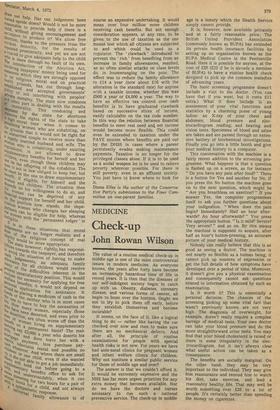MEDICINE
Check-up
John Rowan Wilson
The value of a routine medical check-up in middle age is one of the most controversial issues in modern medicine. As everyone knows, the years after forty have become an increasingly hazardous time of life in recent years. It is then that the diseases of our self-indulgent society begin to catch up with us. Obesity, diabetes, coronary disease, and various forms of cancer, all begin to loom over the horizon. Ought we not to try to pick them off early, before they establish themselves and become incurable?
It seems, on the face of it, like a logical thing to do — rather like having the car checked over now and then to make sure there are no mechanical defects. And after all, the principle of routine examinations for people with special health risks is not new. For years we have had ante-natal clinics for pregnant women and infant welfare clinics for children. Why not institute a similar public service for those of middle age and over?
The answer is that we couldn't afford it. It would be extremely expensive and the NHS has far more urgent priorities for any extra money that becomes available. Nor do we have the doctors and nurses necessary to run such a national preventive service. The check-up in middle age is a luxury which the Health Service simply cannot provide.
It is, however, now available privately and at a fairly reasonable price. The British United Provident Association (commonly known as BUPA) has extended its private health insurance facilities by setting up an organisation known as the BUPA Medical Centre in the Pentonville Road. Here it is possible for anyone, at the cost of £25 (£22 if he is already a member of BUPA) to have a routine health check designed to pick up the common maladies of advancing years.
The basic screening programme doesn't include a visit to the doctor. (You can have that if you want, but it costs £11 extra.) What it does include is an assessment of your vital functions and statistics by a charming posse of young ladies: an X-ray of your chest and abdomen; blood pressure and electrocardiogram reading; and hearing and vision tests. Specimens of blood and urine are taken and are passed through an extensive battery of biochemical investigations. Finally you go into a little booth and give your medical history to a computer.
This conversation with the machine is a fairly recent addition to the screening programme. What happens is that a question is flashed up on a screen, as for instance "Do you have any pain after food?" There is a button for Yes and another for No. If you press the No button the machine goes on to the next question, which might be "Are you breathless on exertion?" If you answer Yes, the computer programmes itself to ask you further questions about your indigestion. "When does the pain begin? Immediately? Half an hour afterwards? An hour afterwards?" You press the appropriate button. "Is it mild? Severe? Very severe?" and so on. By this means the machine is supposed to acquire, after half an hour's button-pressing, an accurate picture of your medical history.
Nobody can really believe that this is as good as seeing a doctor. The machine is not nearly so flexible as a human being, it cannot pick up nuances of expression or get the full details of how symptoms have developed over a period of time. Moreover, it doesn't give you a physical examination and consequently cannot ask questions related to information obtained by such an examination.
Is it worth it? This is essentially a personal decision. The chances of the screening picking up some vital fact that wasn't previously known are not very high. The diagnosis of overweight, for example, doesn't really require a complex barrage of medical tests. Your own doctor can take your blood pressure and do the more straightforward urine tests. You may find that your blood cholesterol is raised or there is some irregularity in the electrocardiogram, but it isn't always clear what useful action can be taken as a consequence.
The benefits are socially marginal. On the other hand, they may be very important to the individual. They may give him reassurance and remind him to watch his diet, take exercise, and lead a reasonably healthy life. That may well be worth something over £25 to a lot of people. It's certainly better than spending the money on cigarettes.










































 Previous page
Previous page